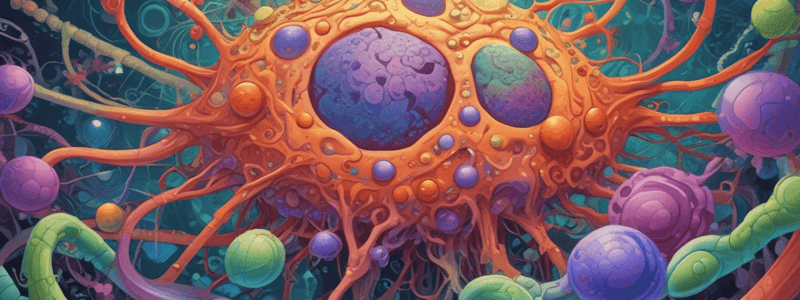Podcast
Questions and Answers
What is the primary function of pattern recognition receptors?
What is the primary function of pattern recognition receptors?
- To activate immune cells
- To regulate the immune response
- To produce cytokines
- To recognize and bind to pathogens (correct)
What is the role of chemokines in the immune response?
What is the role of chemokines in the immune response?
- To guide immune cells to sites of infection or inflammation (correct)
- To produce cytokines
- To regulate immune cell signaling
- To recognize pathogens
What is the primary mode of action of cytokines in immune cell signaling?
What is the primary mode of action of cytokines in immune cell signaling?
- Producing chemokines
- Binding to specific receptors on target cells (correct)
- Recognizing pathogens
- Regulating the immune response
What is the purpose of immune response regulation?
What is the purpose of immune response regulation?
What is the effect of some cytokines on the immune response?
What is the effect of some cytokines on the immune response?
What is the classification of pattern recognition receptors based on?
What is the classification of pattern recognition receptors based on?
What is the primary function of cytokines in the immune response?
What is the primary function of cytokines in the immune response?
Which of the following cytokines is classified as pro-inflammatory?
Which of the following cytokines is classified as pro-inflammatory?
What is the role of pattern recognition receptors (PRRs) in the immune response?
What is the role of pattern recognition receptors (PRRs) in the immune response?
What is the outcome of cytokines sending signals to immune cells?
What is the outcome of cytokines sending signals to immune cells?
What is the primary function of chemokines in the immune response?
What is the primary function of chemokines in the immune response?
What is the overall goal of immune response regulation?
What is the overall goal of immune response regulation?
Study Notes
Immune Response: Understanding Cytokines, Pattern Recognition Receptors, Chemokines, Immune Cell Signaling, and Immune Response Regulation
The immune response is a complex and intricate process that involves various cells and molecular interactions to defend the body against foreign invaders. This article will focus on the subtopics of cytokines, pattern recognition receptors, chemokines, immune cell signaling, and immune response regulation, providing a comprehensive understanding of these key components.
Cytokines
Cytokines are a class of signaling proteins that play a crucial role in regulating inflammation and immune responses. They are produced by various immune cells and act as chemical messengers to coordinate immune cell activities. Cytokines can be classified based on the nature of the immune response, with individual cytokines performing specific roles. Some cytokines, such as tumor necrosis factor (TNF) and interleukin-1 (IL-1), are pro-inflammatory and can stimulate the production of other cytokines, while others, like interferons (IFNs), are antiviral and can activate immune cells. Cytokines send signals to immune cells, instructing them on where to go and what to do to fight invaders or repair damaged tissue.
Pattern Recognition Receptors (PRRs)
PRRs are proteins found on the surface of immune cells that recognize specific molecular patterns on pathogens, such as bacteria and viruses. They are responsible for initiating the immune response by recognizing and binding to these pathogens, triggering a cascade of events that leads to the activation of immune cells. PRRs can be classified into several types, including toll-like receptors (TLRs), retinoic acid-inducible gene (RIG)-I-like receptors, and nucleotide-binding oligomerization domain (NOD)-like receptors.
Chemokines
Chemokines are a group of small, low molecular weight proteins that act as chemoattractants, guiding immune cells to sites of infection or inflammation. They are crucial for the coordinated movement and positioning of immune cells during homeostasis and the immune response. Chemokines are divided into four groups based on the positioning of their initial cysteine residues: XC, CC, CXC, and CX3C. Different chemokines have distinct functions, such as regulating the migration and positioning of immune cells and coordinating interactions between the innate and adaptive immune systems.
Immune Cell Signaling
Immune cell signaling is the process by which immune cells communicate with each other and with other cells in the body. This communication is essential for mounting an effective immune response. Cytokines play a central role in immune cell signaling, as they bind to specific receptors on target cells and activate a cascade of downstream signaling events that culminate in the expression of a set of genes necessary for a specialized task. The mode of action of cytokines can be autocrine, paracrine, or endocrine, depending on the cells involved and the distance over which the signaling occurs.
Immune Response Regulation
The immune response is a complex process that requires careful regulation to ensure an appropriate response to pathogens without causing excessive damage to the host. This regulation is achieved through a combination of positive and negative feedback mechanisms. For example, some cytokines can stimulate the production of other cytokines, creating a positive feedback loop that amplifies the immune response. At the same time, other cytokines can inhibit the production of pro-inflammatory cytokines, providing negative feedback to maintain the immune response within appropriate limits.
In summary, the immune response is a highly coordinated process that involves various cells and molecular interactions to defend the body against foreign invaders. Cytokines, pattern recognition receptors, chemokines, immune cell signaling, and immune response regulation are all key components of this process, working together to ensure an effective and balanced immune response.
Studying That Suits You
Use AI to generate personalized quizzes and flashcards to suit your learning preferences.
Description
Explore the complex process of immune response, covering cytokines, pattern recognition receptors, chemokines, immune cell signaling, and immune response regulation. Learn how these components work together to defend the body against pathogens and maintain a balanced immune response.



